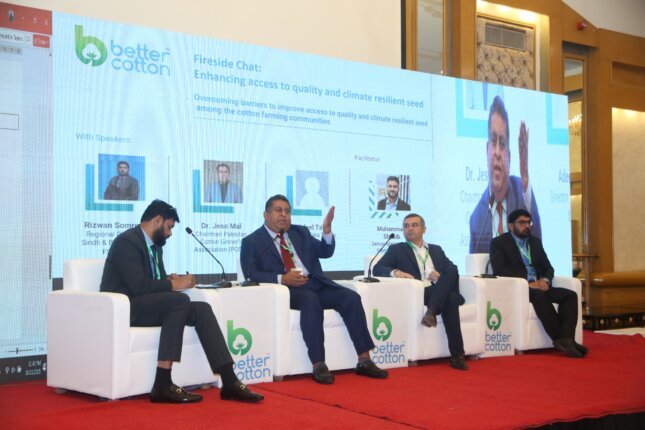KARACHI: Better Cotton (BC), in collaboration with the Pakistan Central Cotton Committee (PCCC), hosted the National Conference on Cotton Revival: The White Gold of Pakistan—From Challenges to Opportunities at the Marriott Hotel, Karachi. The event brought together key stakeholders, including government officials, policymakers, researchers, and industry leaders, to address the decline in cotton production and chart a path for revival.
Pakistan’s cotton and textile industry is a cornerstone of the economy, supporting exports, employment, and millions of livelihoods. The conference focused on Sindh and Balochistan, highlighting their pivotal role in cotton cultivation. Over 100 participants, including parliamentary leaders, technocrats, and representatives from APTMA, PCGA, the seed sector, and BC’s program partners such as WWF, CABI, REEDS, and SWRDO, attended the event.
Key Discussions and Policy Recommendations
Opening the conference, Iain Gardiner, Senior Director of Development and Impact at Better Cotton, emphasized the need for a sustainable, forward-thinking approach to cotton production. Dr. Zulfiqar Ali Bhatti, Parliamentary Secretary, Ministry of Commerce, reaffirmed the federal government’s commitment to reviving the cotton sector, stressing the importance of policy frameworks and crop traceability.
Maj. Gen. Shahid Nazir (R), HI (M), Director General of the Green Pakistan Initiative (GPI), proposed structural reforms, including a PCCC overhaul, setting an indicative cotton price, and eliminating the 18% sales tax on local production.
Sindh’s Minister of Agriculture, Muhammad Bux Khan Mahar,
highlighted provincial efforts such as the “Grow More Cotton” campaign and subsidies for modern irrigation techniques. Noor Ahmad Pirkani, Secretary of Agriculture, Balochistan, noted the province’s potential as an emerging cotton hub but cited water scarcity and limited access to certified seeds as major challenges.
Dr. Yusuf Zafar, Vice President of PCCC, analyzed the decline in cotton production, advocating for heat-resistant seeds and contract farming to support growers.
Industry Perspectives and the Road Ahead
Experts from WWF, CABI, Soorti Enterprises, Lasbela University, TASSCO Seed Company, and the Sindh Abadgar Association shared success stories and strategies for revitalizing the sector. The conference concluded with a shared vision to restore cotton production to at least 15 million bales—a target last achieved in 2015.




